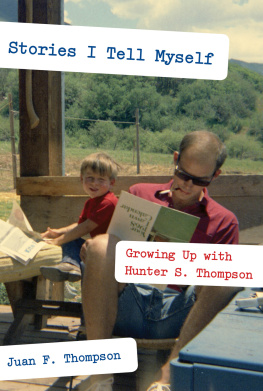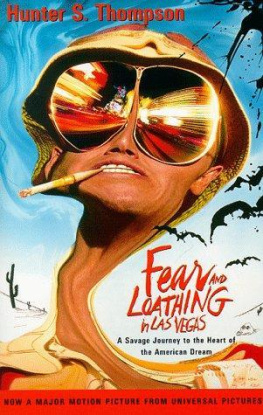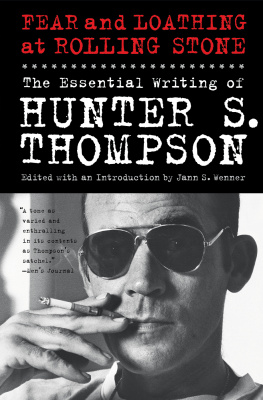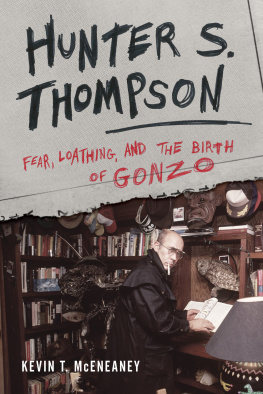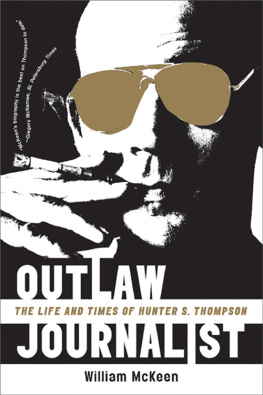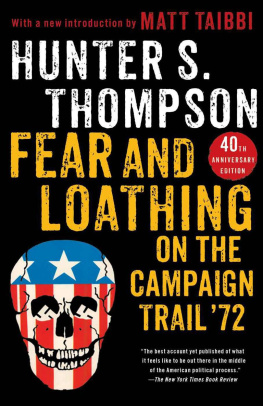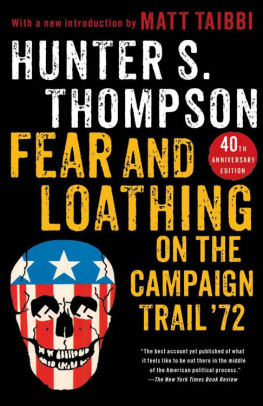Thompson Hunter S. - Stories I tell myself : growing up with Hunter S. Thompson
Here you can read online Thompson Hunter S. - Stories I tell myself : growing up with Hunter S. Thompson full text of the book (entire story) in english for free. Download pdf and epub, get meaning, cover and reviews about this ebook. year: 2016, publisher: Knopf Doubleday Publishing Group;Alfred A. Knopf, genre: Non-fiction. Description of the work, (preface) as well as reviews are available. Best literature library LitArk.com created for fans of good reading and offers a wide selection of genres:
Romance novel
Science fiction
Adventure
Detective
Science
History
Home and family
Prose
Art
Politics
Computer
Non-fiction
Religion
Business
Children
Humor
Choose a favorite category and find really read worthwhile books. Enjoy immersion in the world of imagination, feel the emotions of the characters or learn something new for yourself, make an fascinating discovery.
- Book:Stories I tell myself : growing up with Hunter S. Thompson
- Author:
- Publisher:Knopf Doubleday Publishing Group;Alfred A. Knopf
- Genre:
- Year:2016
- Rating:5 / 5
- Favourites:Add to favourites
- Your mark:
Stories I tell myself : growing up with Hunter S. Thompson: summary, description and annotation
We offer to read an annotation, description, summary or preface (depends on what the author of the book "Stories I tell myself : growing up with Hunter S. Thompson" wrote himself). If you haven't found the necessary information about the book — write in the comments, we will try to find it.
Now Juan Thompson tells the story of his father and of their getting to know each other during their forty-one fraught years together. He writes of the many dark times, of how far they ricocheted away from each other, and of how they found their way back before it was too late.
He writes of growing up in an old farmhouse in a narrow mountain valley outside of AspenWoody Creek, Colorado, a ranching community with Hereford cattle and clover fields . . . of the presence of guns in the house, the boxes of ammo on the kitchen shelves behind the glass doors of the country cabinets, where others might have placed china and knickknacks . . . of climbing on the back of Hunters Bultaco Matador trail motorcycle as a young boy, and father and son roaring up the dirt road, trailing a cloud of dust . . . of being taken to bars in town as a small boy, Hunter holding court while Juan crawled around under the bar stools, picking up change and taking his found loot to Carls Pharmacy to buy Archie comic books . . . of going with his parents as a baby to a Ken Kesey/Hells Angels party with dozens of people wandering around the forest in various stages of undress, stoned on pot, tripping on LSD . . .
He writes of his growing fear of his father; of the arguments between his parents reaching frightening levels; and of his finally fighting back, trying to protect his mother as the state troopers are called in to separate father and son. And of the inevitableof mother and son driving west in their Datsun to make a new home, a new life, away from Hunter; of Juans first taste of what normal could feel like . . .
We see Juan going to Concord Academy, a stranger in a strange land, coming from a school that was a log cabin in the middle of hay fields, Juan without manners or socialization . . . going on to college at Tufts; spending a crucial week with his father; Hunter asking for Juans opinion of his writing; and he writes of their dirt biking on a hilltop overlooking Woody Creek Valley, acting as if all the horrible things that had happened between them had never taken place, and of being there, together, side by side . . .
And finally, movingly, he writes of their long, slow pull toward reconciliation . . . of Juans marriage and the birth of his own son; of watching Hunter love his grandson and Juans coming to understand how Hunter loved him; of Hunters growing illness, and Juans becoming both son and father to his father
Thompson Hunter S.: author's other books
Who wrote Stories I tell myself : growing up with Hunter S. Thompson? Find out the surname, the name of the author of the book and a list of all author's works by series.

